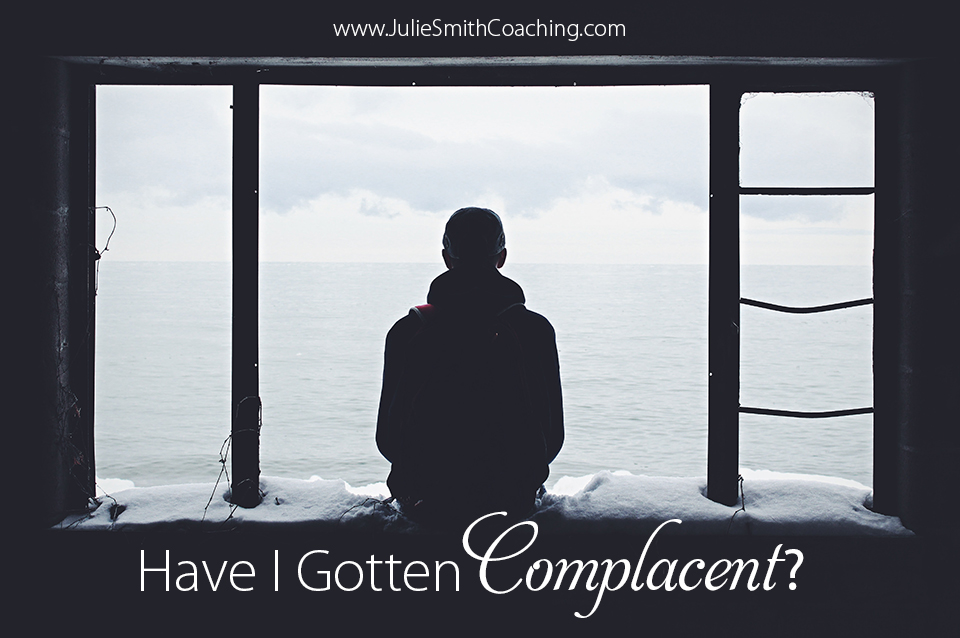“Have I gotten complacent?” This is the question that has come up, recently, in a number of conversations. Talented individuals who’ve worked hard to achieve a notable level of success in life and career find themselves in a state of unrest. Not experiencing the same level of drive they once knew and desiring something different, yet not fully articulated. The question sits heavy.
Before we examine the question further, let’s first look to the meaning of complacent. The Oxford English Dictionary states complacency is “a feeling of smug or uncritical satisfaction with oneself or one’s achievements.” Immediately this reminds me of a successful company or maybe an athlete who is so confident in their abilities and achievements, that they don’t try to improve. They become unaware and eventually lose out to new competition. They “rest on their laurels” so to speak. I understand why clients and other high achievers might fear this when they start to question and feel unsettled. Consider, however, that perhaps there’s something else at play.
Stories From the Personal Development Road
Many years ago, when I started my business, my clients were very successful motivational speakers and business coaches. Their followers were people who were driven by an elusive dream of success that, in many cases, was influenced by someone or something outside of themselves: society, an influencer, a parent, a teacher, a spouse, a friend, a sports coach.
These individuals would go into many thousands of dollars in debt following guru after guru who had the ‘secret’ to that success. Some of them achieved great success and wondered why they still felt unhappy. Others, no matter how hard they tried, did not succeed in the way they’d hoped. The person then felt like a failure; empty and stuck; comparing themself to others, and in large amounts of debt. They were still searching for something they hadn’t yet found.
Today, I often hear statements like these:

“I make a great income; I have all the things I want; I have a wonderful family and/or friends… and I should be happy. So why do I feel so unsatisfied?“
“I have everything I wanted, yet it feels like something’s missing.”
“I just don’t have the drive to keep up that pace anymore. All I want to do is… (insert some other activity).”
“I need to keep setting bigger goals. I need to work harder. If I slow down and feel like I’m ok with that, I must be complacent or lazy. I’ll be settling for less than what I’m capable of.”
Do you hear yourself in any of these statements? It’s a place I found myself a number of years ago, and it’s taken a lot of soul searching and personal growth to move beyond it. Sometimes I still go there. How do we get to this place of unrest and questioning? Because, let’s admit that it’s an uncomfortable place to be.
Reasons You Might Feel Like You’ve Gotten Complacent
Definition of Success

Are you judging your own feelings, desires, and actions against what our society says you “should” be, do, or have to be a success? Maybe you’ve been hoodwinked by the popular “go big or go home” philosophy to believe that anything less than a grand vision, max effort, and bold action means you’re less than ambitious and settling for less than the best. I sometimes call this “goal shame.” How sustainable is it to hold yourself to that standard?
If you’re chasing after someone else’s definition of success, you’ve misplaced your ladder and you’re climbing up the wrong wall. You find yourself in a situation where you’re trying to meet others’ expectations instead of pursuing what’s meaningful to you.
Out of Alignment
With some reflection and self-awareness, you may find that you are taking actions that are out of alignment with your values, your greatest strengths and sense of purpose. Core values are the foundation for how we live and make decisions; how we spend our time and money. When you try to take actions that are out of alignment with your core values, you get stuck… every time. This is the context for my Success Factor program that helps you define what success means to you and create a roadmap to get there that’s in personal alignment.
That being said, while your core values rarely change; your priorities often do. Priorities you set for yourself in your 20’s or 30’s may look entirely different in your 50’s and beyond. These changing priorities can also throw you into a place of dissatisfaction and unrest.
Life Transitions
Instinctively, we know that each of us develops and grows over the course of a lifetime. It’s in those early adult years that you begin striving and driving for whatever definition of success you’ve adopted for yourself.
As we move through life, we experience periods of transition where we grapple with deeper issues that often have more to do with how we’re “being” than what we’re “doing.” Those transitions can be our times of greatest growth and development, leading to freedom from past issues, greater life maturity, spiritual intimacy, and increased influence. I believe this is where many people I talk with, having reached mid-life with successful careers and many achievements, may find themselves when they ask, “Have I gotten complacent?”
Challenges and Processing Events
Often a life challenge, major life change or crisis can signal the beginning of a transition period. We all experience disappointments, failure, conflict and loss during our lifetimes. You may not be able to change the nature of the circumstances you find yourself in, but you can always choose how you will respond.
As Dr. Paul Leavenworth, of the Grand View Center for Mentor Coaching and Leadership Development, likes to say, “You can either let your circumstances define you or you can let them transform you.” Lean into the transitions and the processing events. Be present even if it’s painful. A growth mindset helps you grasp the power of your own thinking, attitude, choices and actions in shaping your destiny.
The Solution: Fresh Perspective

If you’ve been striving and driving, on autopilot, to maintain or advance your current level of success and achievement. If you’re not “feeling” it and you’re asking yourself the complacency question, perhaps the alternative solution is fresh perspective.
Maybe you’ve been attending to your career and material progress, and even personal relationships quite well. But have you checked in with yourself to identify if you’re still on the right path? Without that, it’s all too easy to find that you’ve set sail and then allowed your boat to drift. Is it time to make a course correction?
What You Might Learn From Perspective
If you take the time to be in the discomfort and not try to “fix” everything as quickly as possible, you will surely learn something about yourself. Take the time for self-reflection and real soul searching. Perhaps those familiar, unsettling statements might find themselves with a reframe like one of these:
- “I’m not settling for less than what’s possible because I no longer want that vision of what’s possible. I’m choosing another direction that’s more in alignment with what’s true for me now.”
- “I realize now that I was in love with the idea of what’s possible in that vision, but the journey to get there drains me. It steals my joy. I’m discovering the truth of what’s most important to me.”
- “I enjoy what I’m doing, the impact I make, and the reward it provides me. I’m making a difference, and my needs are satisfied.”
- “I’m contented, for now, with what I have, and I’m committed to being the best I can be in that space.”
Brene Brown often talks about “Enoughness.” She says,
“We live in a culture of never enough: never good enough, never skinny enough, never popular enough, never enough Twitter followers… And there’s only one way out of scarcity and that is enoughness. At some point, we just need to say “enough.” I am enough. What I’m doing is enough.”

There are books, articles, videos, online courses… all aimed at helping us achieve happiness, fulfillment, and finding “our best self.” We all long for a sense of joy and contentment. Why, then, do we question or judge ourselves when making a change, or striving less, or adjusting our expectations helps us to achieve that?
Maybe, with self-reflection, you will answer the question for yourself, “What is enough?” Maybe you will begin to appreciate the value of not adapting to all you’ve achieved and continuously wanting more, but rather celebrating the goodness of what is. You may begin to find joy in the good and the challenging; the everyday and the extraordinary. Somewhere in that space you may find greater life satisfaction and well-being.
Learn It. Apply It.
- Regularly check in for self-reflection. Am I on track? Is what I’m working toward what I want?
- How can you lean into a transition or challenge you may be experiencing? What is it meant to teach you?
- In what ways might you have let circumstances define you? How could they bring about transformation?
- Reflect on how your attitudes and thoughts (even subconscious ones) impact your emotions and ultimately your actions.
- You always have a choice about how to respond to any situation. What will you choose?
Maybe you’ve been asking the complacency question, or you’re grappling with a challenge or a work or life transition. Or maybe it feels like it’s time to point yourself in a direction that feels more in alignment with who you are and what’s most important to you now. Let’s schedule a time to talk. I’d be honored to walk down that road with you. As I like to say, we align head, heart and hands so you can do good at work and in life.


 Julie Smith is a certified Life Coach, Leadership Coach and Health Coach. She empowers others to create calm and clarity through work and life transitions. Together, they build confidence, create postive change, and greater well-being so they can lead themselves and the organizations and families they serve. Her clients include purpose-driven professionals, leaders and organizations.
Julie Smith is a certified Life Coach, Leadership Coach and Health Coach. She empowers others to create calm and clarity through work and life transitions. Together, they build confidence, create postive change, and greater well-being so they can lead themselves and the organizations and families they serve. Her clients include purpose-driven professionals, leaders and organizations.